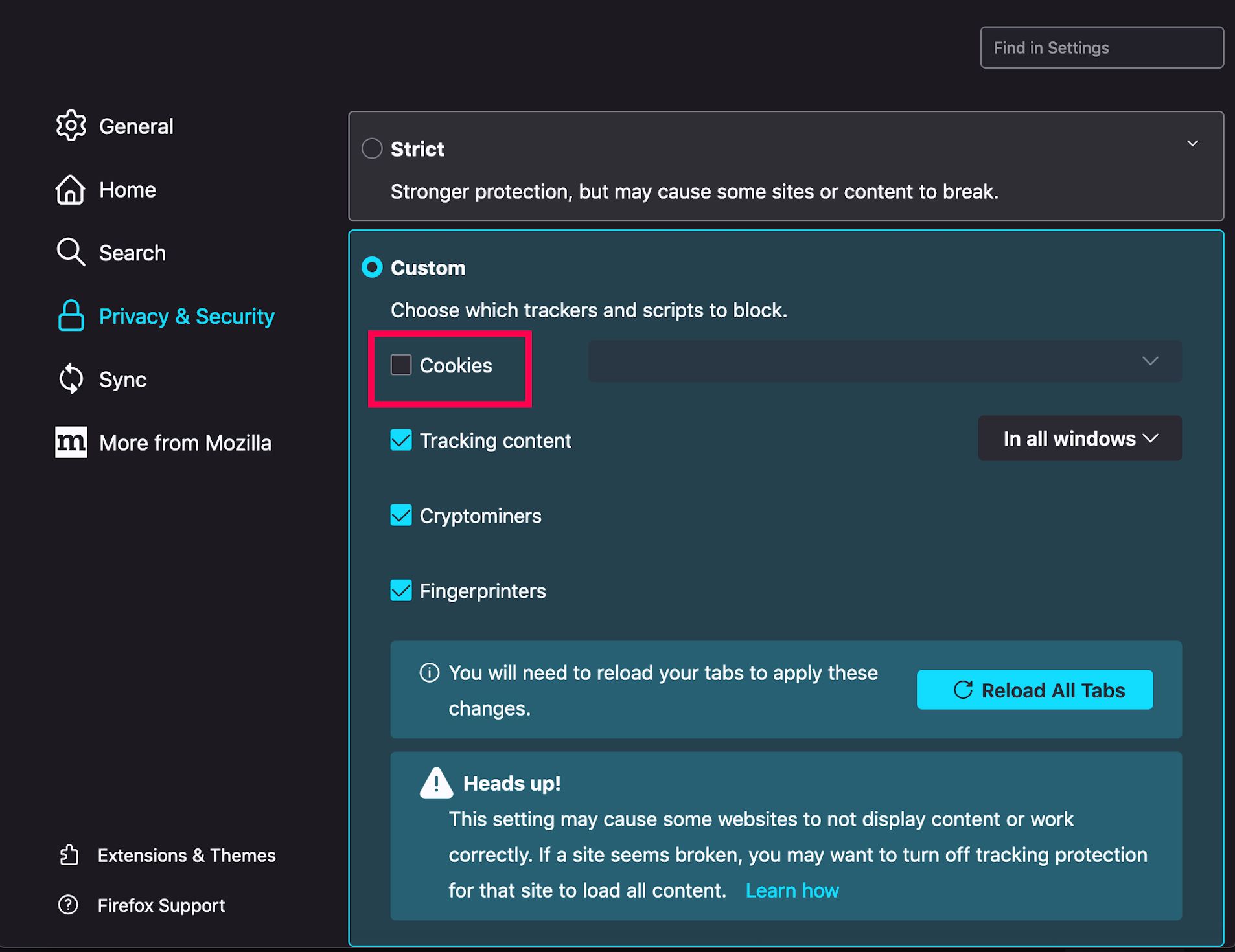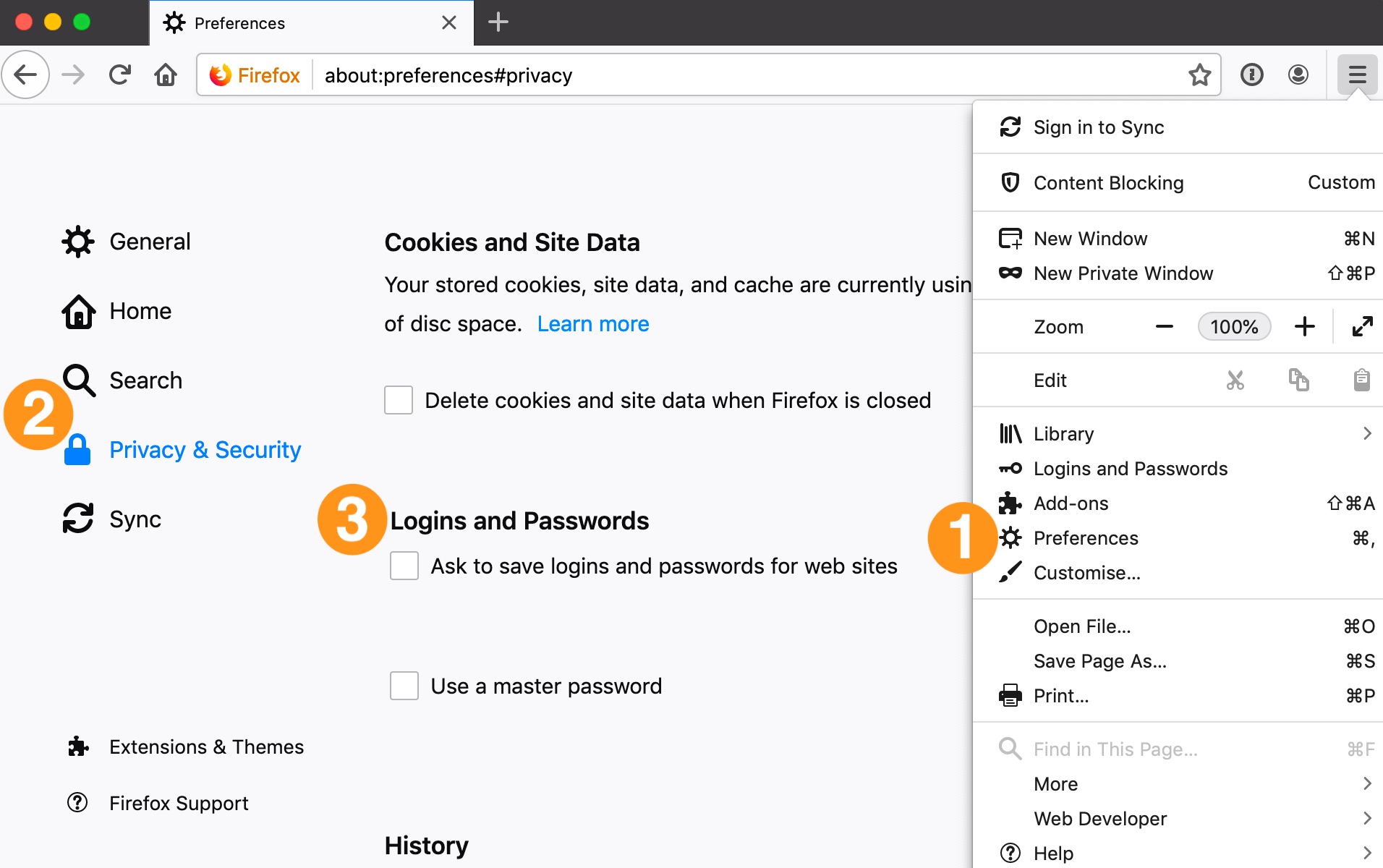Introduction
When it comes to browsing the web, cookies play a crucial role in enhancing the user experience. These small pieces of data are stored on your computer by websites you visit, and they serve various purposes, such as remembering login credentials, tracking user preferences, and personalizing content. While first-party cookies are set by the website you are directly interacting with, third-party cookies are set by domains other than the one you are currently visiting. In this article, we will delve into the realm of third-party cookies and explore how to allow them in the Firefox browser.
Understanding the functionality and implications of third-party cookies is essential for anyone seeking to optimize their browsing experience. By gaining insights into the significance of these cookies and learning how to manage them effectively, users can make informed decisions about their online privacy and security. Moreover, understanding how to enable third-party cookies in Firefox can empower individuals to access a wider range of web content and enjoy a seamless browsing experience across various platforms.
As we embark on this exploration, it's important to recognize that the ability to allow third-party cookies in Firefox can open up new possibilities for accessing personalized content, utilizing integrated services, and enjoying a more tailored online experience. By grasping the nuances of this process, users can harness the full potential of the web while maintaining control over their privacy settings. Let's delve into the world of third-party cookies and discover the steps to enable them in the Firefox browser, unlocking a realm of enhanced functionality and personalized interactions.
Understanding Third Party Cookies
Third-party cookies are a fundamental component of the modern web ecosystem, playing a pivotal role in facilitating seamless interactions between different websites and services. Unlike first-party cookies, which are set by the domain directly visited by the user, third-party cookies are set by domains other than the one currently being accessed. These cookies enable cross-site tracking, allowing advertisers, analytics providers, and other third-party entities to gather information about a user's browsing behavior across multiple websites.
The primary function of third-party cookies is to enable personalized advertising and content delivery. By tracking users' activities across various websites, these cookies help create detailed profiles that can be used to deliver targeted advertisements and personalized content. This level of personalization enhances the user experience by presenting relevant and engaging content based on individual preferences and browsing habits.
However, the use of third-party cookies has sparked debates regarding privacy and user consent. Critics argue that the extensive tracking enabled by these cookies can infringe upon user privacy and lead to potential data misuse. Concerns about user consent and transparency in data collection have prompted discussions about the ethical implications of third-party cookie usage.
In response to these concerns, web browsers and regulatory bodies have introduced measures to enhance user privacy and control over third-party cookies. For example, Firefox, a popular web browser developed by Mozilla, provides users with the option to manage their cookie settings, including the ability to block or allow third-party cookies based on their preferences.
Understanding the role of third-party cookies is essential for users seeking to navigate the complexities of online privacy and data tracking. By gaining insights into how these cookies operate and their impact on the browsing experience, individuals can make informed decisions about managing their privacy settings and controlling the flow of data between different websites and services.
As we delve deeper into the realm of third-party cookies, it becomes evident that they are a double-edged sword, offering personalized experiences while raising valid concerns about user privacy and data protection. By comprehending the intricacies of third-party cookies, users can navigate the digital landscape with greater awareness and make conscious choices about their online interactions and privacy preferences.
Why Allow Third Party Cookies in Firefox
Enabling third-party cookies in the Firefox browser can unlock a myriad of benefits, enhancing the overall browsing experience and enabling seamless interactions across various websites and services. While the debate surrounding the privacy implications of third-party cookies continues, there are compelling reasons why users may choose to allow these cookies in Firefox.
-
Personalized Content and Recommendations: Allowing third-party cookies in Firefox can lead to personalized content recommendations and tailored experiences across different websites. By enabling these cookies, users may encounter content, products, and services that align with their interests and preferences, creating a more engaging and relevant browsing experience.
-
Integrated Services and Functionality: Many websites rely on third-party cookies to integrate services and functionalities from external domains. By enabling these cookies in Firefox, users can access seamless integrations, such as social media plugins, embedded multimedia content, and personalized advertisements, enhancing the overall functionality and interactivity of websites.
-
Enhanced User Experience: Third-party cookies contribute to a more seamless and personalized user experience by enabling features such as saved preferences, targeted advertisements, and streamlined login processes. Allowing these cookies in Firefox can lead to a smoother and more tailored browsing experience, reducing the need for repetitive logins and enhancing the accessibility of personalized content.
-
Access to Cross-Site Features: Many websites leverage third-party cookies to provide cross-site features, such as single sign-on capabilities and integrated services from external platforms. By enabling these cookies in Firefox, users can access a wider range of integrated features and services, streamlining their interactions across different websites and platforms.
-
Support for Content Providers and Publishers: Allowing third-party cookies in Firefox can support content providers and publishers by enabling targeted advertising and personalized content delivery. These cookies play a crucial role in sustaining the digital ecosystem, allowing content creators to monetize their platforms and deliver relevant content to their audiences.
While the decision to allow third-party cookies in Firefox involves considerations of privacy and data tracking, it's important to recognize the potential benefits that these cookies can offer in terms of personalized experiences, integrated services, and enhanced functionality. By understanding the implications and weighing the trade-offs, users can make informed choices about managing their cookie settings in Firefox, aligning their preferences with their desired browsing experience.
How to Allow Third Party Cookies in Firefox
Enabling third-party cookies in the Firefox browser is a straightforward process that empowers users to customize their cookie settings based on their preferences. By allowing third-party cookies, users can access a wider range of personalized content, integrated services, and seamless browsing experiences. Here's a step-by-step guide to enabling third-party cookies in Firefox:
-
Accessing Firefox Preferences: To begin, open the Firefox browser on your computer and navigate to the menu icon located in the top-right corner of the browser window. Click on the menu icon to reveal a dropdown menu, and then select "Preferences" to access the browser settings.
-
Navigating to Privacy & Security Settings: Within the Preferences menu, locate and click on "Privacy & Security" in the left-hand navigation panel. This section houses various privacy and security settings that allow users to manage their browsing preferences, including cookie settings.
-
Customizing Cookie Settings: Under the Privacy & Security settings, scroll down to the "Cookies and Site Data" section. Here, users can customize their cookie preferences, including the option to allow or block third-party cookies. To enable third-party cookies, ensure that the checkbox next to "Accept third-party cookies and site data" is selected.
-
Fine-Tuning Cookie Permissions: For users who prefer more granular control over their cookie settings, Firefox offers the option to manage exceptions for specific websites. By clicking on the "Manage Permissions" button within the Cookies and Site Data section, users can add exceptions for individual websites, allowing them to set custom cookie preferences for different domains.
-
Confirming Changes: Once the desired cookie settings have been configured, users can simply close the Preferences tab to save the changes. Firefox will apply the updated cookie settings, allowing third-party cookies as per the user's preferences.
By following these simple steps, users can enable third-party cookies in the Firefox browser, unlocking a realm of personalized content, integrated services, and enhanced browsing experiences. It's important to note that while allowing third-party cookies can enhance the functionality and personalization of web content, users should consider their privacy preferences and make informed decisions about their cookie settings based on their individual needs and browsing habits. With the ability to customize cookie preferences, Firefox empowers users to strike a balance between personalized experiences and privacy control, ensuring a tailored and secure browsing environment.
Conclusion
In conclusion, the ability to allow third-party cookies in the Firefox browser presents users with a spectrum of considerations, ranging from personalized experiences and integrated services to privacy and data tracking concerns. By understanding the functionality and implications of third-party cookies, individuals can make informed decisions about managing their cookie settings, aligning their preferences with their desired browsing experience.
Enabling third-party cookies in Firefox can lead to personalized content recommendations, seamless integrations, and enhanced user experiences. The access to cross-site features and support for content providers and publishers further underscores the potential benefits of allowing these cookies. However, it's crucial for users to weigh these advantages against the backdrop of privacy considerations and data tracking implications.
The step-by-step guide to enabling third-party cookies in Firefox empowers users to customize their cookie settings based on their preferences. By providing a straightforward process to manage cookie preferences, Firefox ensures that users can strike a balance between personalized experiences and privacy control, fostering a tailored and secure browsing environment.
As the digital landscape continues to evolve, the discourse surrounding third-party cookies remains dynamic, with ongoing discussions about privacy, user consent, and data transparency. By staying informed about these developments and leveraging the tools and options provided by Firefox, users can navigate the complexities of online privacy and data tracking with greater awareness and agency.
Ultimately, the decision to allow third-party cookies in Firefox is a personal one, influenced by individual preferences, browsing habits, and privacy considerations. By embracing a nuanced understanding of third-party cookies and their impact on the browsing experience, users can navigate the digital realm with clarity and confidence, making conscious choices that align with their values and preferences.
In essence, the ability to allow third-party cookies in Firefox represents a convergence of functionality, personalization, and privacy considerations. By embracing this convergence, users can harness the full potential of the web while maintaining control over their online privacy, ensuring a harmonious balance between personalized experiences and data transparency.

























